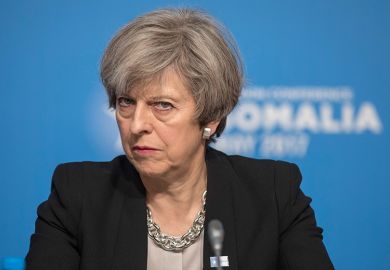The hobbling of Theresa May might leave those in charge of universities feeling like they are skipping through fields of wheat. One senior sector figure says that, even if she clings on in the medium term, the election result is a “potential game changer” in terms of policies affecting higher education.
The Conservative manifesto darkly threatened, in a line best appreciated if you imagine it read aloud in stern tones by the formerly all-powerful May as she hurls a lightning bolt from on high: “Overseas students will remain in the immigration statistics…and within scope of the government’s policy to reduce annual net migration.” A pledge to “toughen the visa requirements for students” was also included, just in case anyone missed her grim determination on this point.
Even before the election she faced huge opposition from Tory colleagues on overseas students. As a diminished, humiliated figure relying on the support of colleagues, she will struggle to implement manifesto policies that were unpopular with the party.
May has also been forced to dispose of her two closest aides. Her new chief of staff, Gavin Barwell, who lost his Croydon Central seat in the election, wrote a Daily Telegraph article in 2013 warning that the dramatic decline in the number of Indian students coming to Britain was “hitting the UK where it hurts” by having an economic impact. He was writing then in his capacity as co-chair of Migration Matters, a group made up of “politicians, business executives and trade union leaders” that described itself as acknowledging “the positives of migration” as well as the challenges.
Barwell wrote in his Telegraph article: “My constituents are concerned about levels of immigration, but they’re not opposed to tourists coming here, foreign students studying at our great universities and foreign businesses investing here.” That sounds very different from the manifesto.
Could May’s hobbling mean that overseas students are finally removed from the net migration target? Or could the whole target be dropped? That might seem more likely if and when the prime minister stands aside. Or perhaps a reverse on overseas students could be a dramatic way for May to signal that she has adopted a more collegial approach, in which she actually listens to colleagues.
Prospects for another manifesto pledge – to hold “a major review of funding across tertiary education” – might also be reduced now, given government priorities in negotiating Brexit from a position of weakness. That looked like a vehicle for the misguided view that universities had somehow emerged from austerity with pockets stuffed with cash, a means to shift funding away from them towards further education and May’s promised institutes of technology.
On the other hand, Justine Greening, who remains as education secretary, might have to find something to occupy herself if pragmatic Conservatives manage to bin May’s plans for new grammar schools.
If hard Brexit is a casualty of the general election result (a big if), that would be another beam of sunshine for universities. It could promise a fresh approach on the rights of European Union staff to remain, on access and funding for EU students, on the future immigration regime more generally and also on access to EU research programmes.
May’s crutch keeping the Tories in government is Northern Ireland’s Democratic Unionist Party, or the “political wing of the 18th century” as detractors would have it. Actually, the DUP sounds more open and internationalist than May in the Brexit section of its manifesto, which includes as a priority “higher education and further education continuing to attract international expertise and collaboration”.
Another Brexit priority for the DUP is “continued participation in funding programmes that have been proven to be of benefit and are open to non-EU members e.g. research funding”.
Following more noises pre-election about the UK government’s refusal to subscribe to free movement and its phobia about the smallest technical role for the European Court of Justice being potential barriers to joining EU framework programmes as an associated country, any extra ballast behind universities as they push towards continued European collaboration will be welcome.
The DUP is also opposed to the return of a hard Irish border, which seems to demand a softer approach to Brexit. Irish and Northern Irish universities have warned that any hard border would damage academic links between them and with the UK mainland.
There are plenty of reasons why those running universities might feel a bit more optimistic about the future after the election result. Ultimately, they might be most pleased if May exits, taking the nativist approach with her and being replaced by a more open, internationalist prime minister.
Register to continue
Why register?
- Registration is free and only takes a moment
- Once registered, you can read 3 articles a month
- Sign up for our newsletter
Subscribe
Or subscribe for unlimited access to:
- Unlimited access to news, views, insights & reviews
- Digital editions
- Digital access to THE’s university and college rankings analysis
Already registered or a current subscriber?



